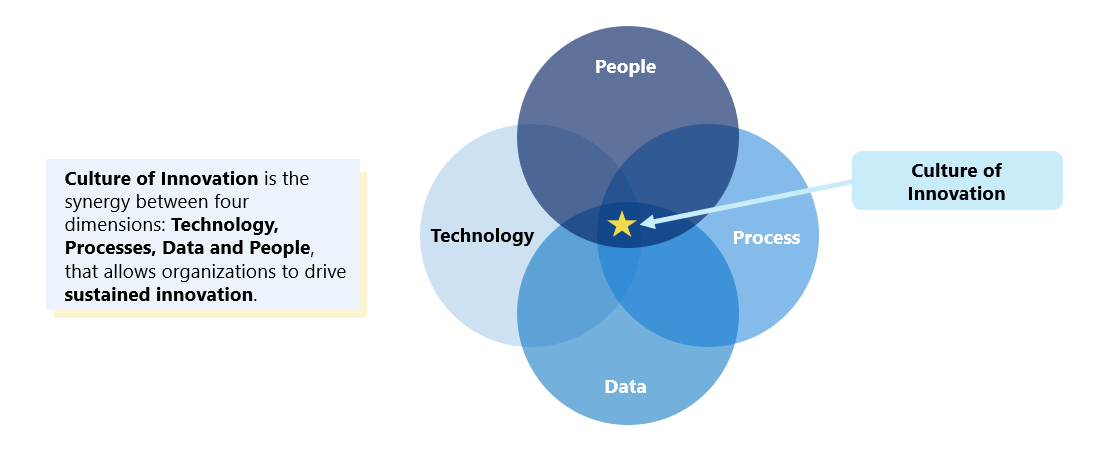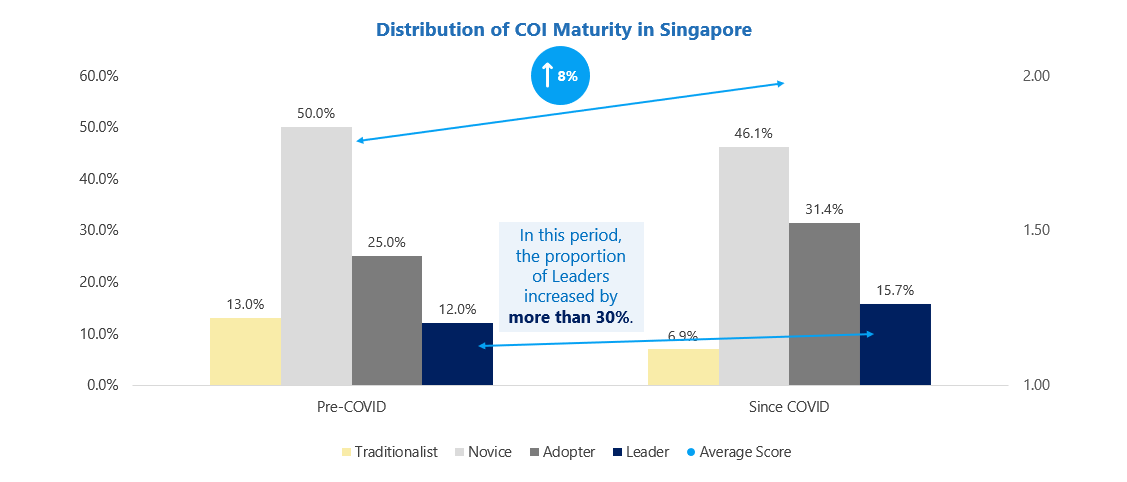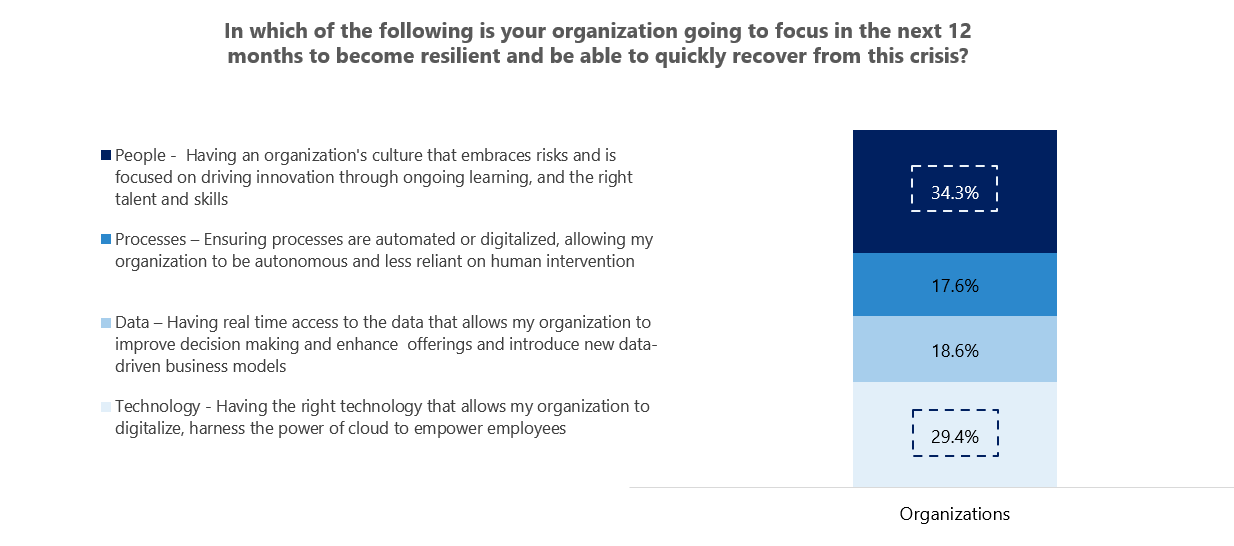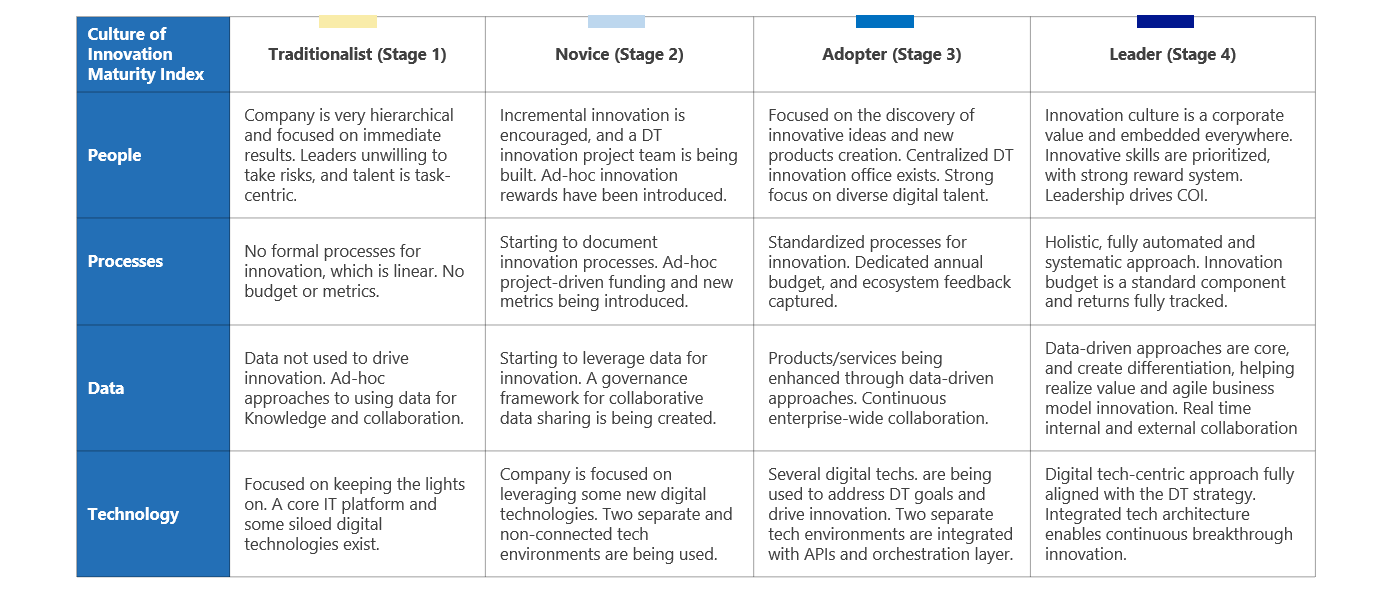- 80% of Singapore business decision-makers say innovation is a ‘must’, not just good-to-have; they see the ability to innovate as vital to performance and resilience, according to a new Microsoft-IDC study[1].
- 73% of Singapore organisations are accelerating the pace of digitalisation in response to the pandemic.
- More businesses in Singapore are considered Leaders[2] in Culture of Innovation (16%) compared to the rest of Asia Pacific (8%); since COVID-19, the proportion of Leaders among organisations in Singapore increased from 12% to 16%.
Singapore, 10 September 2020 – As Singapore and Asia Pacific continue to deal with the disruptions resulting from the COVID-19 pandemic, 80% of business decision-makers in Singapore today versus 67% pre-COVID say that innovation is now a ‘must’ for them to respond quickly to market challenges and opportunities, and ensure success. This is echoed by almost all (98%) leading organisations in Asia Pacific with the most mature Culture of Innovation (Leaders) who agree that innovation is a necessity to staying resilient during a crisis.
Innovation has become more critical and easier as the pandemic has forced organisations to innovate
“Innovation is no longer an option, but essential to survival and success. With the pandemic and the economic crisis it has brought, all of us are experiencing new challenges and changes at a speed and scale that we’ve not had to address before. While it is obvious that organisations have prioritised technology adoption to enable remote working and business continuity, we have seen that those that have emerged stronger are the ones who have integrated the ability to innovate into the core of their organisations,” said Kevin Wo, Managing Director, Microsoft Singapore.
In fact, nearly three quarters (73%) of Singapore organisations are speeding up digitalisation in a variety of ways to adapt to the new reality – from launching digital products and introducing digital payments to embracing ecommerce and automation. During this period, the proportion of Singapore businesses who are Leaders in innovation have also increased by more than 30% (up by 4 percentage points) from pre-COVID times.
“Organisations across Singapore realised how much their ability to innovate fuels their performance and business resilience during the crisis. They were also forced to innovate and accelerate transformation in response to the challenges and new market conditions. Doing so, they have learned it is not as hard as they had anticipated. More than half (52%) of organisations in Singapore now say they find it easier to drive innovation, compared to 3 in 10 (31%) of them before COVID-19 – across Asia Pacific, this number also rose from 32% to 64%,” explained Sandra Ng, Group Vice President, Practice Group, IDC Asia/Pacific.
These findings were released by Microsoft in its latest study with IDC Asia Pacific which surveyed 202 business decision makers and 219 workers in Singapore within a 6-month period, before and since COVID-19. The Singapore study was part of a broader survey among 3,312 business decision makers and 3,495 workers across 15 markets in Asia Pacific conducted over the same time-period. Titled “Culture of Innovation: Foundation for Business Resilience and Economic Recovery in Asia Pacific”, it uncovered how organisations can successfully strengthen business resilience and fuel performance through innovation.
“We originally commissioned this research to gain better insights into the relationship between having a culture of innovation and an organisation’s growth. But now, beyond achieving growth, we see that having a mature culture of innovation translates to stronger resilience for organisations and an ability to recover faster than their peers,” Kevin shared.
Growing proportion of Leaders among Singapore organisations
The study also introduced the Culture of Innovation Framework, which spans the dimension of People, Process, Data and Technology, to assess organisations’ approach to innovation. Through the research, organisations’ performance was mapped against four dimensions (People, Processes, Data and Technology), with organisations grouped in four stages – Traditionalist (Stage 1), Novice (Stage 2), Adaptor (Stage 3) and Leaders (Stage 4). Leaders comprise organisations that are the most mature in building a Culture of Innovation[3].
Fig 1: Culture of Innovation Framework
The study found that in the span of six months, organisations in Singapore have matured in the Culture of Innovation by 8%, an indication that they have increased their ability to innovate. In comparison, organisations in Asia Pacific saw an 11% growth in Culture of Innovation maturity, with the regional proportion of Leaders increasing by more than 50%.
While Singapore’s increase was slightly lower than Asia Pacific’s average increase, there is a higher representation of Leaders (Stage 4) in Singapore (16%) than the Asia Pacific average (8%). This is important as 1 in 3 Leaders expect to increase their market share despite the pandemic and almost 1 in 2 (45%) believe that their organisations will be able to recover from the impact of COVID-19 in 6 months or less.
Fig 2: Growth in Culture of Innovation Maturity in Singapore (%)
“We see amongst Leaders a constant appetite for growth and evolution. During COVID-19, 45% of them said they think their business model will lose its competitiveness in 5 years’ time, as compared to 34% of Singapore firms. This desire and urgency for continuous improvement through agility and adaptation to change will determine the success of businesses in this new normal,” said Sandra Ng, Group Vice President, Practice Group, IDC Asia/Pacific.
Increasing focus on People and Technology in Singapore
Moving forward, business decision-makers in Singapore said they will prioritise the need to introduce new ways of working with remote work being the new norm as a long-term strategy to future proof their business.
Specifically, of the Culture of Innovation dimensions, People (34.3%) and Technology (29.4%) were found to be the two foremost priorities for Singapore organisations moving into the next year – a similar trend was observed across the region.
Fig 3: People and Technology as the two focus areas for organisations in Singapore (%)
“It is encouraging to see that business leaders in Singapore are recognising that without a focus on people and digital culture, any digital transformation ambition is weakened,” shared Kevin. “Investing in their employees’ capabilities and skills to better leverage technology – what we term as Tech Intensity – is a critical component of the Culture of Innovation.”
While the People dimension remains the weakest for all organisations in Singapore and Asia Pacific, there are lessons that we can learn from Leaders. Among some of the best practices that business decision-makers in Singapore should consider are:
- Culture: 89% of Leaders (Singapore 75%) have developed a culture of promoting disruptive ideas and encouraging innovation as a corporate culture.
- Rewards/Incentive: 82% of Leaders (Singapore 64%) prioritise and formalise innovation rewards over traditional performance.
- Talent: 82% of Leaders (Singapore 66%) hire a diverse cross-industry, multi-cultural and multi-generational workforce.
- Skilling: 70% of Leaders (Singapore 57%) invest in growing enterprise-wider capabilities and skilling initiatives.
Culture of Innovation – a success formula for resilience and faster economic recovery
Using the Culture of Innovation Framework, the study revealed the best practices that organisations can adopt to progress across People, Process, Data and Technology. Specifically, organisations are encouraged to:
1. Fortify resilience with Technology
Strengthen the organisation’s approach to digital transformation through resilient technologies allowing simplification, flexibility and agility – cloud, Artificial Intelligence and Machine Learning. At the same time, ensure that cybersecurity is infused into the organisation’s digital footprint.
2. Invest in People’s capabilities and skills
Create open and inclusive environment to attract the best and diverse talent. Integrate workplace innovation efforts that will be crucial to accelerate transformation, ensuring the right rewards and incentives to encourage innovation and upskilling to sustain the pace of innovation, by unlocking people’s capabilities.
3. Leverage Data to increase competitiveness
Capitalise on the value of data through developing new data-driven products and services and revenue streams for organisation’s competitiveness. It will be key that data-driven insights are leveraged for enterprise-wide collaboration and decision-making to institute a knowledge sharing culture.
4. Redesign Processes (and jobs) to empower people to continuously drive innovation
Create a systematic approach to drive innovation – from ideation to commercialisation and establish a centralised digital transformation budget, along with digital key performance indicators. Customer centricity should be at the heart of continuous improvements, and a feedback loop is necessary to capture learnings on an ongoing basis.
“With organisations in Singapore performing better relative to their regional counterparts, the potential and appetite for Singapore businesses to digitalise and recover despite the crisis is strong. Thinking of new business models, empowering employees with new digital skills, integrating processes and redesigning jobs are just some of the ways organisations can use technologies to transform and meet the needs of the new normal” said Kevin.
“It’s imperative that in addition to a robust digital foundation, our people are equipped to collaborate and drive disruption. Our goal is to realise a future where all organisations in Singapore are dynamic and resilient – to recover well and thrive despite the crisis,” concluded Kevin.
###
Appendix: Stages of Culture of Innovation
[1] Research background for Culture of Innovation: Foundation for Business Resilience & Economic Recovery in Asia Pacific:
- The study was conducted in two phases – Phase 1 (Pre-COVID; Dec 2019-Jan 2020) and Phase 2 (Since COVID-19; July 2020) with participants from organizations with more than 250 staff.
- It covered 15 Asia Pacific markets, including Australia, China, Hong Kong, Indonesia, India, Japan, Korea, Malaysia, New Zealand, Philippines, Singapore, Sri Lanka, Taiwan, Thailand, and Vietnam.
- Phase 1 – 1,622 business leaders and 1,823 workers (100 business leaders and 115 workers in Singapore) participated; Phase 2 – 1,690 business leaders and 1,672 workers (102 business leaders and 104 workers in Singapore) participated.
[2] Leaders, or leading organisations, comprise 8% of all organisations surveyed. These leaders fall into the most mature stage (Stage 4) of the Culture of Innovation model comprising the areas of People, Process, Data and Technology.
[3] Please refer to Appendix for full framework


